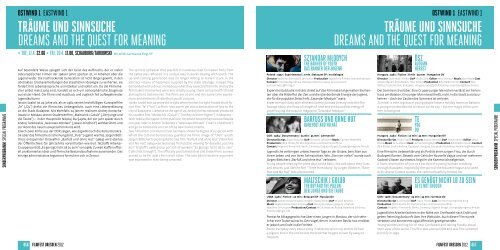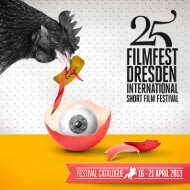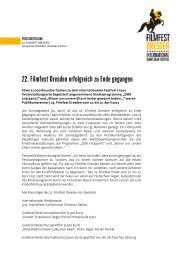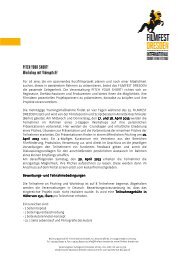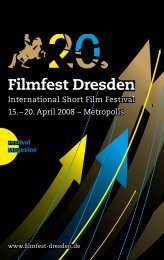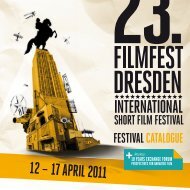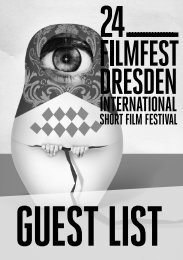Erfolgreiche ePaper selbst erstellen
Machen Sie aus Ihren PDF Publikationen ein blätterbares Flipbook mit unserer einzigartigen Google optimierten e-Paper Software.
SONDERpROGRAMM SPECial PrOgrammE<br />
OSTWIND 1 EaSTWiNd 1<br />
TRäUME UND SINNSUCHE<br />
drEamS aNd ThE quEST FOr mEaNiNg<br />
TUE, 17.4. 22.00 FRI, 20.4. 17.00, SCHAUbURG/TARKOWSKI OV with German & Eng. ST<br />
Auf besondere Weise spiegelt sich der Geist des Aufbruchs, der in vielen<br />
osteuropäischen Filmen der 1960er Jahre spürbar ist, in Arbeiten über die<br />
Jugend wider. die nachrückende Generation ist nicht länger gewillt, in den<br />
abstrakten Glücksverheißungen der staatlichen Ideologie zu verharren, sie<br />
fordert ihre Lebensansprüche unmittelbar und sofort ein. da die Filmemacher<br />
selbst meist jung sind, handelt es sich um atmosphärische Zeugnisse<br />
aus erster Hand. die Filme sind Ausdruck und zugleich Teil aufbegehrender<br />
Jugendkulturen.<br />
István Szabó ist 24 Jahre alt, als er 1962 seinen leichtfüßigen Kurzspielfilm<br />
„Te“ („du“) dreht: ein filmisches Liebesgedicht, auch eine Liebeserklärung<br />
an die Stadt Budapest. Mit ebenfalls 24 Jahren realisiert Andrej Kontschalowski<br />
in Moskau seinen Studentenfilm „Maltschik i Golub“ („der Junge und<br />
die Taube“) – in der Hauptrolle nikolaj Burljajew, der ein Jahr später durch<br />
Andrej Tarkowskis „Iwanowo detstwo“ („Iwans Kindheit“) weltberühmt und<br />
zur Ikone des neuen sowjetischen Kinos wird.<br />
Gleich zwei Filme aus der ddR zeigen, wie argwöhnisch die Kulturbürokratie<br />
über das filmische Erscheinungsbild „ihrer“ Jugend wachte. Jürgen Böttchers<br />
entspannter ostseefilm „Barfuß und ohne Hut“ (1964) wird ebenso<br />
der Öffentlichkeit für Jahrzehnte vorenthalten wie Kurt Tetzlaffs Arbeiter-<br />
Gruppenporträt „Es genügt nicht 18 zu sein“ von 1966. Zu weit klaffen offiziell<br />
proklamiertes Ideal und filmische Bestandsaufnahme auseinander. das<br />
einzige administrative Argument formuliert sich in Zensur.<br />
056 FILMFEST DRESDEN 2012<br />
The spirit of upheaval that was felt in numerous East European films from<br />
the 1960s was reflected in a unique way in works dealing with youth. The<br />
up-and-coming generation was no longer willing to remain stuck in the<br />
abstract visions of happiness supplied by the state ideology; instead they<br />
demanded with a direct immediacy what they expected from life. And as the<br />
filmmakers themselves were also mostly young, these concerned firsthand<br />
atmospheric testimonies. The films are at one and the same time expressions<br />
and elements of rebellious youth cultures.<br />
István Szabó was 24 years old in 1962 when he shot his light-footed short fiction<br />
film “Te” (“You”): A filmic love poem, yet also a declaration of love to the<br />
city of Budapest. Likewise at the age of 24, Andrej Kontschalowski produced<br />
his student film “Maltschik i Golub” (“The Boy and the pigeon”) in Moscow –<br />
with nikolaj Burljajew in the lead role. He would become famous worldwide<br />
one year later in Andrei Tarkovsky’s “Iwanowo detstwo” (“Ivan’s Childhood”)<br />
and go on to become an icon of the new Soviet cinema.<br />
Two films from communist East Germany show the degree of suspicion with<br />
which the cultural bureaucracy guarded the filmic image of “their” youth.<br />
Jürgen Böttcher’s exciting Baltic Sea film “Barfuß und ohne Hut” (“Barefoot<br />
and no Hat”, 1964) was restricted from public viewing for decades, just like<br />
Kurt Tetzlaff’s 1966 group portrait of workers “Es genügt nicht 18 zu sein”<br />
(“18 Is not Enough”). The officially proclaimed ideal and these filmic surveys<br />
proved to be far apart from each other. The sole administrative argument<br />
was expressed in their being censored.<br />
SzTANDAR MŁODyCH<br />
THE bANNER OF yOUTH<br />
DAS bANNER DER jUGEND<br />
Poland | 1957 | Experimental | 2 min | Betacam SP | no dialogue<br />
Director Walerian Borowczyk, Jan Lenica Production Wytwórnia Filmów dokumentalnych<br />
Contact Filmoteka narodowa, Warsaw, poland, Justyna Turczynowicz;<br />
jturczynowicz@fn.org.pl<br />
Experimentalstudie mit teils direkt auf das Filmmaterial gemalten Elementen<br />
über die Bilderflut der Zeit und die überbordende Energie der Jugend,<br />
die für die populäre Zeitschrift „Sztandar Młodych“ warb.<br />
Experimental study with elements partly painted directly onto the film<br />
footage about the flood of images of time and the boundless energy of<br />
youth buying the popular magazine “Sztandar Młodych”.<br />
bARFUSS UND OHNE HUT<br />
bAREFOOT AND NO HAT<br />
GDR | 1964 | Documentary | 25 min | 35 mm | German OV<br />
Director/Script Jürgen Böttcher DoP Christian Lehmann Music Gerhard Rosenfeld<br />
Production dEFA-Studio für Wochenschau und dokumentarfilme<br />
Contact progress Filmverleih, Berlin, Germany, dagmar Bingel; d.bingel@progress-film.de<br />
Jugendliche verbringen unbeschwerte Tage an der ostsee, berichten aus<br />
ihrem Leben und von ihren Sehnsüchten. Wie „drei von vielen“ wurde auch<br />
Jürgen Böttchers „Barfuß und ohne Hut“ verboten.<br />
Young people relaxing for some days at the Baltic Sea talk about their lives<br />
and desires. Just like the film “Three from Many” by Jürgen Böttcher, “Barefoot<br />
and no Hat” was also banned.<br />
MALTSCHIK I GOLUb<br />
THE bOy AND THE pIGEON<br />
DER jUNGE UND DIE TAUbE<br />
USSR | 1961 | Fiction | 20 min | Betacam SP | Russian OV<br />
Director Andrej Kontschalowski, Jewgeni ostaschenko DoP Michail Koschin<br />
Music Wjatscheslaw owchinnikow Cast nikolaj Burljajew, Jewgeni Urbanski,<br />
Wladimir Schurupow Production/Contact WGIK, Moscow, Russia, Valentina Schorina;<br />
filmofond@vgik.info<br />
poetische Alltagsgeschichte über einen Jungen in Moskau, der sich sehnlichst<br />
eine Taube wünscht. den Vogel, den er in seinem Besitz hat, entlässt<br />
er jedoch am Ende in die Freiheit.<br />
poetic everyday story about a boy in Moscow who truly wishes he had<br />
a pigeon. But in the end he lets the bird that he gets to own fly away to<br />
freedom.<br />
OSTWIND 1 EaSTWiNd 1<br />
TRäUME UND SINNSUCHE<br />
drEamS aNd ThE quEST FOr mEaNiNg<br />
ÖSz<br />
AUTUMN<br />
HERbST<br />
Hungary | 1961 | Fiction | 8 min | 35 mm | Hungarian OV<br />
Director Zsolt Kézdi-Kovács DoP István Zöldi Editor Vera Selmeczi Music Józef nepp Cast<br />
Tamás Végvári, Ilona Balázs, Tibor Szilárd Production Béla Balázs Studio Contact Béla<br />
Balázs Studio Archive, Budapest, Hungary, Sebastyén Kodolányi; kodolanyi@bbsarchiv.hu<br />
der Sommer ist vorüber. Eine Gruppe junger Menschen verlässt ein Ferienhaus<br />
am Balaton. Ein junger Mann beschließt, nicht in die Stadt zurückzukehren<br />
– doch der Zauber des Sommers ist verloren.<br />
Summer is over. A group of young people leave a holiday home on Balaton.<br />
A young man decides not to return to the city – but the magic of the summer<br />
is now gone.<br />
TE<br />
yOU<br />
DU<br />
Hungary | 1962 | Fiction | 10 min | 35 mm | Hungarian OV<br />
Director/Script István Szabó Producer András németh DoP Tamás Vámos Editor János<br />
Rózsa Music W. A. Mozart Cast Cecília Esztergályos Production Béla Balázs Studio Contact<br />
Béla Balázs Studio Archive, Budapest, Hungary, Sebastyén Kodolányi; kodolanyi@bbsarchiv.hu<br />
Eine filmische Liebeserklärung als porträt einer jungen Frau, die durch<br />
Budapest flaniert. Beseelt vom Geist der nouvelle Vague und von mehreren<br />
Godard-Zitaten durchsetzt, folgt ihr die Kamera schwelgerisch.<br />
A filmic declaration of love as a portrait of a young woman rambling<br />
through Budapest. Inspired by the spirit of the nouvelle Vague and laced<br />
with several Godard quotes, the camera feastfully follows her.<br />
ES GENüGT NICHT 18 zU SEIN<br />
18 IS NOT ENOUGH<br />
GDR | 1966 | Documentary | 23 min | 35 mm | German OV<br />
Director/Script Kurt Tetzlaff DoP Franz Thoms Cast voiceover by Manfred Krug<br />
Production dEFA-Studio für Wochenschau und dokumentarfilme<br />
Contact progress Filmverleih, Berlin, Germany, dagmar Bingel; d.bingel@progress-film.de<br />
Jugendliche Arbeiter bohren in der nähe von Greifswald nach Erdöl und<br />
geben freimütig Auskunft über ihre Weltsicht. Auch dieser Film wurde<br />
verboten und konnte erst 1990 öffentlich gezeigt werden.<br />
Young workers drilling for oil near Greifswald and talking frankly about<br />
their view of the world. This film was also banned and was first screened<br />
publicly in 1990.<br />
FILMFEST DRESDEN 2012 057<br />
SOONDERpROGRAMM SPECial PrOgrammE


